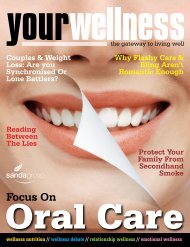New India_Assurance_ISSUE_July-2018
You also want an ePaper? Increase the reach of your titles
YUMPU automatically turns print PDFs into web optimized ePapers that Google loves.
15<br />
Untangle These Secrets<br />
How you wash your hair and<br />
the products you use can go a long<br />
way toward maintaining smooth,<br />
shiny, gorgeous hair. According<br />
to the American Academy of<br />
Dermatologists (www.aad.org),<br />
here are some top tips for healthy<br />
hair:<br />
• Wash oily hair more frequently.<br />
How often you wash your hair<br />
should be based on how much<br />
oil your scalp produces.<br />
• If your scalp is oily, you may<br />
need to wash it as often as once<br />
a day.<br />
• If you have chemically treated<br />
hair, your hair may be drier, so<br />
you may want to wash it less<br />
frequently.<br />
• As you get older, your scalp<br />
makes less oil, so you may not<br />
need to shampoo as often. But if<br />
you see flakes in your hair, you<br />
may not be shampooing enough.<br />
This can lead to dandruff and<br />
other scalp diseases.<br />
• Concentrate shampoo on the<br />
scalp. When washing your<br />
hair, concentrate on cleaning<br />
primarily the scalp, rather than<br />
washing the entire length of<br />
hair. Washing only your hair<br />
can create flyaway hair that is<br />
dull and coarse.<br />
• Use conditioner after every<br />
shampoo unless you use a<br />
‘2-in-1’ shampoo, which cleans<br />
and conditions hair. Using a<br />
conditioner can significantly<br />
improve the look of damaged<br />
or weathered hair by increasing<br />
shine, decreasing static<br />
electricity, improving strength<br />
and offering some protection<br />
from harmful UV rays.<br />
• Concentrate conditioner on<br />
the tips of the hair. Because<br />
conditioners can make fine hair<br />
look limp, they only should be<br />
used on the tips of the hair and<br />
not on the scalp or length of<br />
the hair.<br />
• Choose a shampoo and<br />
conditioner formulated<br />
specifically for your hair type.<br />
For example, if you colour your<br />
hair, use a shampoo designed<br />
for colour-treated hair. If your<br />
hair is damaged or chemically<br />
treated, consider a ‘2-in-1’<br />
shampoo.<br />
• Protect hair when swimming.<br />
Protect your hair from the<br />
damaging effects of chlorine by<br />
wetting and conditioning your<br />
hair before swimming. Wear a<br />
tight-fitting swim cap and use a<br />
specially formulated swimmer’s<br />
shampoo and deep conditioner<br />
after swimming to replace lost<br />
moisture.<br />
If you have questions about<br />
caring for your hair, you should<br />
make an appointment to see a<br />
dermatologist.<br />
<strong>July</strong> <strong>2018</strong> • Issue II • Volume VII • yourwellness.com

















